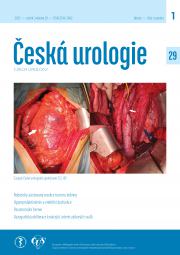Ces Urol 2013, 17(3):193-198 | DOI: 10.48095/cccu2013027
Je vhodné podávat atb profylaxi kojencům se závažnou hydronefrózou před provedení pyeloplastiky?
- 1 Urologická klinika LF UP a FN, Olomouc
- 2 Dětská klinika LF UP a FN, Olomouc
- 3 Radiologická klinika LF UP a FN, Olomouc
Cíl:
Cílem práce je vyhodnotit výskyt akutní pyelonefritidy (APN) u kojenců s hydronefrózou zachycenou při screeningovém ultrazvukovém (UZ) vyšetření, u kterých byla prokázaná závažná obstrukce pelviureterální junkce (PUJO) s nutností provedení pyeloplastiky. Na základě získaných výsledků posoudit nutnost podávání ATB profylaxe do doby operace.
Metoda:
V prospektivní studii byl vyhodnocen výskyt APN před provedením pyeloplastiky u kojenců dispenzarizovaných pro závažnou dilatací kalichopánvičkového systému (KPS) ledviny. Děti byly standardně vyšetřeny UZ a MAG3 scintigrafií, a pokud prodělaly APN, byla provedena mikční cystouretrografie (MCUG). Žádné dítě během dispenzarizace nedostávalo primárně ATB profylaxi, žádný z chlapců nebyl obřezán. Byly vyhodnoceny ultrazvukové a radionuklidové parametry, věk, pohlaví a nálezy byly statisticky posouzeny.
Výsledky:
Bylo operováno 97 dětí, APN se vyskytla u pěti chlapců (5,2 %) v φ věku 1,4 měsíce. Děti, které prodělaly symptomatickou IMC, měly průměr pánvičky 11-22mm, sílu parenchymu 2-7mm, relativní funkci ledviny 40-54%. Nebyla zjištěna statisticky významná závislost výskytu APN na věku, pohlaví, ultrazvukových nebo radionuklidových parametrech. Byla prokázána věcná významnost výskytu APN u chlapců ve věkové skupině do 3 měsíců oproti výskytu APN u dívek a u kojenců starších 3 měsíců.
Závěr:
Po vyhodnocení výsledků studie můžeme konstatovat, že není nutné rutinní podávání ATB profylaxe u kojenců dispenzarizovaných pro závažný stupeň dilatace KPS. Podávání profylaxe by mělo být individuálně zváženo u chlapců do 3 měsíců po narození, u kterých se APN nejčastěji vyskytla.
Klíčová slova: akutní pyelonefritida, ATB profylaxe, hydronefróza, pyeloplastika
Vloženo: 30. duben 2013; Přijato: 13. červen 2013; Zveřejněno: 1. červen 2013
Reference
- Woodward M, Frank D. Postnatal management of antenatal hydronephrosis. BJU Int 2002; 89(2): 149-156. Review.
 Přejít k původnímu zdroji...
Přejít k původnímu zdroji...  Přejít na PubMed...
Přejít na PubMed... - Ammenti A, Cataldi L, Chimenz R, Fanos V, La Manna A, Marra G, Materassi M, Pecile P, Pennesi M, Pisanello L, Sica F, Toffolo A, Montini G. Italian Society of Pediatric Nephrology. Febrile urinary tract infections in young children: recommendations for the diagnosis, treatment and follow-up. Acta Paediatr 2012; 101(5): 451-457.
 Přejít k původnímu zdroji...
Přejít k původnímu zdroji...  Přejít na PubMed...
Přejít na PubMed... - Lee JH, Choi HS, Kim JK, Won HS, Kim KS, Moon DH, Cho KS, Park YS. Nonrefluxing neonatal hydronephrosis and the risk of urinary tract infection. J Urol 2008; 179(4): 1524-1528.
 Přejít k původnímu zdroji...
Přejít k původnímu zdroji...  Přejít na PubMed...
Přejít na PubMed... - Mamì C, Paolata A, Palmara A, Marrone T, Berte LF, Marseglia L, Arena F, Manganaro R. Outcome and management of isolated moderate renal pelvis dilatation detected at postnatal screening. Pediatr Nephrol 2009; 24(10): 2005-2008.
 Přejít k původnímu zdroji...
Přejít k původnímu zdroji...  Přejít na PubMed...
Přejít na PubMed... - Islek A, Güven AG, Koyun M, Akman S, Alimoglu E. Probability of urinary tract infection in infants with ureteropelvic junction obstruction: is antibacterial prophylaxis really needed? Pediatr Nephrol 2011; 26(10): 1837-1841.
 Přejít k původnímu zdroji...
Přejít k původnímu zdroji...  Přejít na PubMed...
Přejít na PubMed... - Song SH, Lee SB, Park YS, Kim KS. Is antibiotic prophylaxis necessary in infants with obstructive hydronephrosis? J Urol 2007; 177(3): 1098-1101.
 Přejít k původnímu zdroji...
Přejít k původnímu zdroji...  Přejít na PubMed...
Přejít na PubMed... - Roth CC, Hubanks JM, Bright BC, Heinlen JE, Donovan BO, Kropp BP, Frimberger D. Occurrence of urinary tract infection in children with significant upper urinary tract obstruction. Urology 2009; 73(1): 74-78.
 Přejít k původnímu zdroji...
Přejít k původnímu zdroji...  Přejít na PubMed...
Přejít na PubMed... - Mamì C, Palmara A, Paolata A, Marrone T, Marseglia L, Bertè LF, Arena F. Outcome and management of isolated severe renal pelvis dilatation detected at postnatal screening. Pediatr Nephrol 2010; 25(10): 2093-2097.
 Přejít k původnímu zdroji...
Přejít k původnímu zdroji...  Přejít na PubMed...
Přejít na PubMed... - Shortliffe LM, McCue JD. Urinary tract infection at the age extremes: pediatrics and geriatrics. Am J Med 2002; 113(Suppl 1A): 55S-66S.
 Přejít k původnímu zdroji...
Přejít k původnímu zdroji...  Přejít na PubMed...
Přejít na PubMed... - Mattoo TK. Are prophylactic antibiotics indicated after a urinary tract infection? Curr Opin Pediatr 2009; 21(2): 203-206. Review.
 Přejít k původnímu zdroji...
Přejít k původnímu zdroji...  Přejít na PubMed...
Přejít na PubMed...


